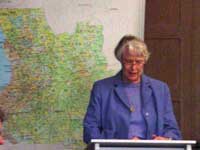Beatrix
Heintze :
Long Distance Caravans
and Communications beyond the Kwango (c. 1850-1890)
 |
Trade, exploration and communication have been very important factors shaping 19th century West Central Africa. Porter caravans, lead by Africans, Luso-Africans and Europeans, had a substantial impact on processes which went far beyond the economic and political implications of trade and involved not only particular objects, skills and knowledge, but also news, information and rumours. Such long-distance caravans created new spaces of communication or enlarged existing ones by linking the local to the translocal. However, these information networks were not stable, because they were dependent on trade routes and caravans, so that any changes in these factors affected the range and structure of the communication networks. Moreover, only to a limited extent did caravans manage to create a single, large communicative space that encompassed all regions through which they passed. In reality, this space tended to become fragmented into sections that were partly cut off from each other. These sections were governed by self-interest, which often led to the creation of impenetrable barriers that prevented information and knowledge from crossing their borders. |

